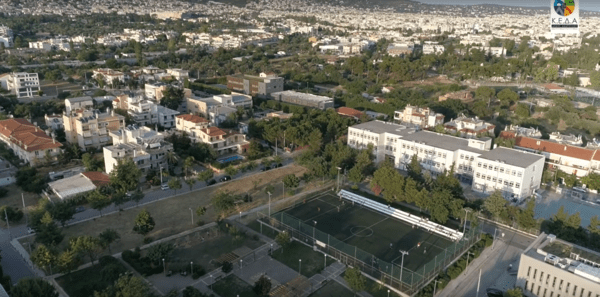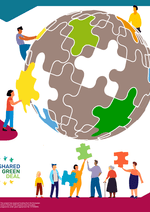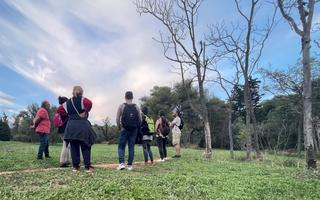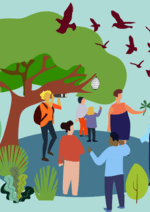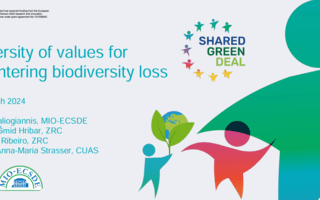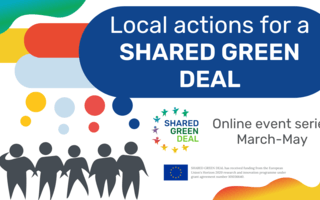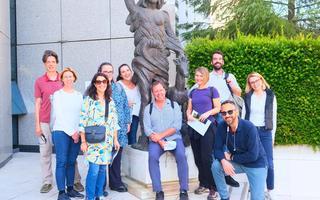Amaroussion Biodiversity Local Experiment (ABLE)
Summary of the local experiment
At its core, this local experiment was an effort to build a sustainable and resilient community that values the natural world and the well-being of all its members. By promoting biodiversity conservation and protection, the initiative aimed at safeguarding the resources that sustain life in our local community, while empowering citizens to take action and make a difference. This was sought to be achieved by promoting the creation of a critical mass of well-informed citizens regarding biodiversity conservation and protection who will act as ambassadors to various community groups and enhance municipal social services by engaging socially marginalized groups and individuals who have experienced isolation and disconnection from their neighbors.
Local context
Municipality of Amaroussion (MoA) is the most important financial and business center of the northern suburbs of Athens, hosting more than 3,500 companies, 3 of the country’s largest shopping malls, 2 Ministries’ premises, 2 Embassies, and 4 Consulates. It is densely populated.
Nevertheless, MoA has 16 urban green spaces, the largest being Syngros grove (approx. 90 hectares). Local flora is representative of Mediterranean vegetation, comprising indigenous species of pine trees as well as centenarian olive trees which can also be found in the wider area of the municipality. However, the natural vegetation of the area has been disturbed by the intense construction activity of the last decades.
MoA has included the protection of local biodiversity in its strategic plan and has implemented a number of activities towards the direction of nature conservation both through EU projects and its own funds in order to assess the current status of local biodiversity and to adapt to climate change by designing effective mitigation and adaptation measures.
Specific needs and challenges
MoA is a densely populated area with high air pollution levels due to heavy traffic. The area is facing many pressuring environmental challenges therefore urgent actions are needed to protect local ecosystems and take mitigation and adaptation measures to climate change.
Thus, MoA is making efforts to offset the carbon footprint created by motorized transportation and diminish land cover due to heavy urbanization by leveraging its urban green spaces which provide air purification and climate regulation services, while hosting several indigenous species of flora and fauna.
Despite the ongoing efforts made by the EU and MoA in particular, citizens living and working in big cities’ centers know little of the value of green spaces and their contribution to local urban ecosystems and health protection. The lack of effective communication and a joint vision of a green “healthy” city shared among inhabitants are only aggravating the problem.
Detailed description of the experiment
Acknowledging the above-mentioned challenges, MoA aimed at enhancing public awareness and engagement in local biodiversity in line with the EU Biodiversity Strategy to 2030 and co-create shared visions with participants of the experiment around urban ecosystems in order to explore solutions to preserve and improve urban biodiversity.
Through ABLE (Amaroussion Biodiversity Local Experiment) and its anticipated monthly Study Circle meetings, participants were exploring together the different valuation placed on biodiversity through on-site visits to local green spaces and corresponding activities, discussions with invited experts and will eventually co-design an educational program leading to a critical mass of well-informed citizens (ambassadors) around local biodiversity. A key aspect of the experiment will be assembling a gender-balanced, diverse group of participants, representing the local community while emphasis will be given to adults who may have experienced isolation (e.g. due to a health problem, discrimination, financial instability, etc.). With targeted groups of interest and key criteria for participation to ABLE, MoA will ensure a meaningful Study Circle group composed of individuals with high differentiation of knowledge and experiences in regards to their engagement with nature, but a common interest to learn more on biodiversity.
Through ABLE, the participants of the experiment sought to deepen their knowledge on biodiversity and assist the local community to adopt a biodiversity positive behavior. This way, a common understanding was soughton: i) the value of urban green spaces as part of the whole natural ecosystem where living species build their habitats, ii) the impact of human activities on them and iii) their contribution to improve urban health.
Additionally, ABLE’s results helped to underpin the development of new relevant initiatives. Participants and their networks were encouraged to participate in the consultation process of the new strategic planning of the municipality for 2023-27 and in the co-design of new pocket parks.
Partners
ABLE was designed to have an inclusive reach, engaging stakeholders from the national and EU level, utilizing MoA’s network from European projects (LIFE-GrIn, SOCIO-Bee) to connect with them. A Quadruple Helix approach was followed to address all four major actors in the innovation system: science, policy, industry, and society. Specifically, it aimed to involve all members of society, including public authorities (MoA, Ministry of Environment and Energy, Social Service Office, etc.), academia (ELGO Dimitra, Institute of Agricultural Sciences, WWF etc.), industry (Chamber of Commerce, local companies), and citizens (parents unions, environmental and cultural associations, etc.). This collaborative approach sought to ensure that ABLE was a truly inclusive initiative, harnessing the collective power of diverse perspectives to promote biodiversity conservation and protection.
Local partner
Municipality of Amaroussion
Country
Greece
Number of inhabitants
70,519
City
Municipality of Amaroussion
Website/social media
Contact person:
Anargyros Roussosaroussos [at] maroussi [dot] gr
Jun 2023
Introduction to Study Circle
Jul 2023
Field visit to Syggrou Estate
Sep 2023
Discussion on fauna
Oct 2023
Field visit to Karela Estate
Nov 2023
Group discussions on biodiversity
Dec 2023
Exploration of urban green spaces
Jan 2024
Insects as pollinators & urban beekeeping
Feb 2024
Hands-on planting sessions
Mar 2024
Presentation of new municipal strategy
Apr 2024
Evaluation and public event
Related Green Deal Priorities
TIMELINE
Case Study Guides
|
Find out more


CONTACT
For further details please contact co-leads Professor Chris Foulds (chris.foulds@aru.ac.uk) and Professor Rosie Robison (rosie.robison@aru.ac.uk).

This project has received funding from the European Union’s Horizon 2020 research and innovation program under grant agreement No 101036640. The sole responsibility for the content of this website lies with the SHARED GREEN DEAL HAS project and does not necessarily reflect the opinion of the European Union.
